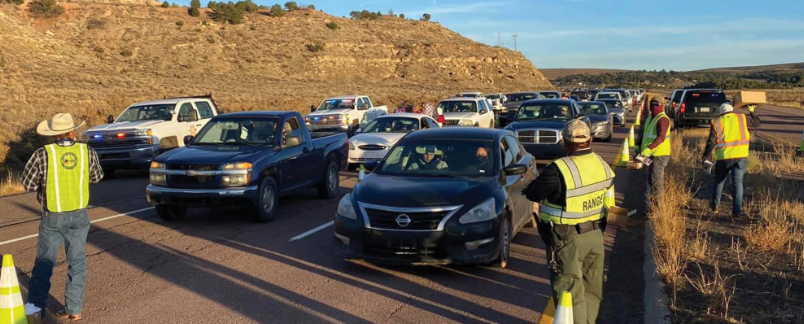
- Details
- By Native News Online Staff
WINDOW ROCK, Ariz. — In the midst of a surge of Covid-19 cases on the nation's largest Indian reservation, Navajo Nation President Jonathan Nez says, "We cannot give up. We have to keep fighting no matter how difficult this pandemic gets. Our public health officials are pleading with everyone to stay home as much as possible."
On Saturday, the Navajo Department of Health, in coordination with the Navajo Epidemiology Center and the Navajo Area Indian Health Service, reported 172 new COVID-19 positive cases for the Navajo Nation and no recent deaths. The total number of deaths remains 598 as previously reported on Friday. Reports indicate that 7,926 individuals have recovered from COVID-19, and 137,986 COVID-19 tests have been administered. The total number of positive COVID-19 cases is now 13,249, including eight delayed unreported cases.
"We have high numbers of COVID-19 cases reported each day, so we need to do a better job of isolating the virus. When we move the virus spreads even more," Nez said. “When we isolate, we isolate the virus and reduce the spread. Please listen to our health experts and stay home, wear a mask, avoid gatherings and crowds, practice social distancing, and wash your hands often. Our ancestors were strong and resilient and we are too, so please be safe and stay local, stay safe," Nez continued.
Navajo Nation COVID-19 positive cases by Service Unit:
- Chinle Service Unit: 2,913
- Crownpoint Service Unit: 1,441
- Ft. Defiance Service Unit: 1,338
- Gallup Service Unit: 2,032
- Kayenta Service Unit: 1,480
- Shiprock Service Unit: 1,983
- Tuba City Service Unit: 1,368
- Winslow Service Unit: 685
* Nine residences with COVID-19 positive cases are not specific enough to place them accurately in a Service Unit.
The Navajo Nation’s 56-hour weekend curfew remains in effect until 5:00 a.m. (MST) on Monday, Nov. 16, 2020 due to the spread of COVID-19 on the Navajo Nation, largely due to travel off the Navajo Nation and family gatherings. On Saturday, the state of New Mexico reported 1,180 new cases of COVID-19, the state of Arizona reported 3,476 new cases, and Utah reported a single-day record-high of 5,352 cases.
On Sunday at 6:00 p.m., the Nez-Lizer Administration will have an online town hall on the Nez-Lizer Facebook page to provide updates on the most recent public health emergency orders and executive order, which will implement a three-week stay-at-home lockdown order for the entire Nation, new provisions for businesses, the closure of government offices with the exception of essential employees, and a call for schools to return to online learning full-time.
To encourage residents to stay local and stay safe during the 56-hour weekend curfew, gas stations, grocery stores, laundromats, and restaurants and food establishments will remain open between the hours of 7:00 a.m. (MST) and 3:00 p.m. (MST). These businesses are required to ensure employees and customers wear masks, practice social distancing, disinfect high-touch surfaces, access to hand wash stations, sanitizers and gloves, and limit the number of customers in any enclosed areas. Restaurants and food establishments must operate on a curbside or drive-thru basis only.
More Stories Like This
Native News Weekly (August 25, 2024): D.C. BriefsDeb Haaland Rolls Out Affordability Agenda in Albuquerque
Boys & Girls Clubs and BIE MOU Signing at National Days of Advocacy
National Congress of American Indians Mourns the Passing of Former Executive Director JoAnn K. Chase
Navajo Nation Mourns the Passing of Former Vice President Rex Lee Jim
Help us defend tribal sovereignty.
At Native News Online, our mission is rooted in telling the stories that strengthen sovereignty and uplift Indigenous voices — not just at year’s end, but every single day.
Because of your generosity last year, we were able to keep our reporters on the ground in tribal communities, at national gatherings and in the halls of Congress — covering the issues that matter most to Indian Country: sovereignty, culture, education, health and economic opportunity.
That support sustained us through a tough year in 2025. Now, as we look to the year ahead, we need your help right now to ensure warrior journalism remains strong — reporting that defends tribal sovereignty, amplifies Native truth, and holds power accountable.
 The stakes couldn't be higher. Your support keeps Native voices heard, Native stories told and Native sovereignty defended.
The stakes couldn't be higher. Your support keeps Native voices heard, Native stories told and Native sovereignty defended.
Stand with Warrior Journalism today.
Levi Rickert (Potawatomi), Editor & Publisher

